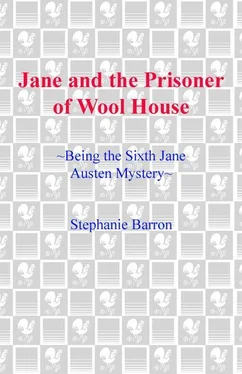Stephanie Barron - Jane and the Prisoner of Wool House
Здесь есть возможность читать онлайн «Stephanie Barron - Jane and the Prisoner of Wool House» весь текст электронной книги совершенно бесплатно (целиком полную версию без сокращений). В некоторых случаях можно слушать аудио, скачать через торрент в формате fb2 и присутствует краткое содержание. Жанр: Исторический детектив, Иронический детектив, на английском языке. Описание произведения, (предисловие) а так же отзывы посетителей доступны на портале библиотеки ЛибКат.
- Название:Jane and the Prisoner of Wool House
- Автор:
- Жанр:
- Год:неизвестен
- ISBN:нет данных
- Рейтинг книги:4 / 5. Голосов: 1
-
Избранное:Добавить в избранное
- Отзывы:
-
Ваша оценка:
- 80
- 1
- 2
- 3
- 4
- 5
Jane and the Prisoner of Wool House: краткое содержание, описание и аннотация
Предлагаем к чтению аннотацию, описание, краткое содержание или предисловие (зависит от того, что написал сам автор книги «Jane and the Prisoner of Wool House»). Если вы не нашли необходимую информацию о книге — напишите в комментариях, мы постараемся отыскать её.
Jane and the Prisoner of Wool House — читать онлайн бесплатно полную книгу (весь текст) целиком
Ниже представлен текст книги, разбитый по страницам. Система сохранения места последней прочитанной страницы, позволяет с удобством читать онлайн бесплатно книгу «Jane and the Prisoner of Wool House», без необходимости каждый раз заново искать на чём Вы остановились. Поставьте закладку, и сможете в любой момент перейти на страницу, на которой закончили чтение.
Интервал:
Закладка:
Martha's younger sister, Eliza, being the wife of the Reverend Fulwar-Craven Fowle, Martha might consider the vicarage at Kintbury as very nearly a second home; and thither she had repaired for the Christmas season. Her mother having passed away not long after my father's death, Martha may claim no other home, and has consented to form a part of our Southampton household.
Cassandra and I will thus know the pleasure of regarding Martha as very nearly a sister, a position we have long desired her to claim. There was a time when we believed it likely she should marry our Frank — but, however, the attraction between them, if indeed it existed, came to nothing. Martha is now in her early forties, some eight years Frank's senior; and with middle age, has acquired the dignity of a lady who dresses in lace caps and black satin. The difference between herself and Frank's rosy-cheeked bride is material, I assure you.
Among her many admirable qualities, Martha brings to our household the accomplishments of a cook, and a compilation of receipts, written out in her own hand, of such comestibles as she has learned to value through the years. In our present dismal weather, Martha should find the journey south from Berkshire cold and tiring; she would wish for a good dinner. As my mother was unlikely to quit her sickbed to procure a joint for Mrs. Davies's cook, I had better look to the business myself.
I rose and dressed for breakfast, sedulously avoiding my reflection in the glass that hangs over my dressing table. The pain of a chapped nose is more than enough to endure, without the added injury of ill looks. But I found that the tea had partially restored me; I felt a greater vigour, from my interval of writing amidst the bedclothes. I could not regard my diminished appearance as reason enough to remain within doors: not one woman in eighty may stand the test of a frosty morning, after all, and my watering eyes and reddened nose should occasion no very great comment on the streets of Southampton.
“Jane!” Frank's Mary exclaimed, as I entered upon the breakfast room, “I did not think to look for you this morning! And you are dressed!”
“I am quite well, Mary, thank you.”
“You are hardly in looks, my dear,” she declared, with utter disregard for my pride. “I am sure that you have a fever. Pray — come and sit beside the fire.”
My brother's bride is a well-grown young woman of one-and-twenty, with a fresh complexion and vivid blue eyes; her hair is glossy, neither brown nor gold, but curling delightfully over her untroubled brow. Mary possesses good health, considerable good humour, and just enough of understanding to please her Frank without attempting to master him. She is not so high-born as to regard a seafaring life with contempt, nor yet so vulgar as to cause the Austens a blush; fond of dress without turning spendthrift; willing to listen to whatever novel I might chuse for our evening's entertainment; and desirous of her husband's credit before and beyond everything. Mary Gibson of Ramsgate, without the warm affections of a brother to praise her, might never have secured my interest; we are too unlike to pass as friends, without the intimacy of blood to unite us. But when I consider the flush of ladies Frank might have pursued — the grasping, prattling, heedless crowd that populates every sailors' ball in every port, and that is mad for officers of any stamp — I consider him as having chosen very well indeed. He certainly could have chosen far worse.
The weight of Mary's child is now impossible to conceal, however much she might let out the seams of her serviceable blue muslin; but she has gained in prettiness what she sacrifices in elegance. A perpetual air of happiness follows her; it is only when talk of her confinement arises that her visage is clouded, and exuberance fled. I am sure that she fears all manner of ills — pain, of course, and the death of her child or herself. Worse than all these, however, is the terror of Frank's possible absence at sea, during the interval of her childbed. She never speaks of it before him, but the women of her household are privileged to know everything. She chatters to us without check or caution, as she might confide in a pack of hounds snoring before the hearth, and never considers of the fact that our loyalties — like our confidences — might be divided between husband and wife.
“Frank has been out early, and brought back kippers!” Mary exclaimed with delight. “And a quantity of fuel for the fire. He purchased nearly a cord of wood from a carter and had it sent round to our lodgings. But now he is gone out again. Should you like some fish?”
“Perhaps not just yet.”
I adopted the chair near the fire and reached for the plate of toast our landlady had provided. Frank had certainly discovered Chessyre's lodgings, then, and might even now be closeted with the Lieutenant.
“I intend to walk out in order to procure a suitable dinner for Martha,” I observed. “And you, Mary? Have you any plans for the morning? A visit, perhaps, among your acquaintance?”
“I shall accompany you to the market, if you have no objection. Mrs. Davies is quite insistent as to the efficacy of boiled eggs, for one in my condition. She assures me that there is nothing like a boiled egg for throwing off a fainting fit, in the evening; but she urges me to choose them myself, so that I might be certain they are wholesome.”
I raised my brows with feigned interest I thought it probable that a surfeit of dinner occasioned Mary's swoons, and might argue for a stricter diet; but lacking personal experience of the lady's state, I could not presume to offer an opinion. The addition of an egg or two, to the quantity of food she consumed, was unlikely to make much difference.
“Lord, how it does rain!” she cried. “I do not envy Martha Lloyd her journey on such a day. I own that I had thought the South would be pleasanter. Did not you, Jane?”
“Having spent most of my life in Hampshire, I may profess to be acquainted with its habits. I expect a severe March, a wet April, and a sharp May,” I returned. “But we may hold out hope for June, Mary. What would England be, after all, without her June?”
“Scotland,” she said promptly, and dissolved in giggles at her own wit.
OUR PLAN OF ATTEMPTING THE STREETS DIRECTLY AFTER breakfast was forestalled, however, by a visitation of ladies from the naval set, who had recently claimed our acquaintance. No less than three of them descended upon our lodgings at eleven o'clock — such an early hour for a morning call, that we were taken by surprise in the very act of tying our bonnet strings, preparatory to quitting the front hall.
“Mrs. Foote!” Mary cried with pleasure, at the sight of the smallest lady among the party — a pink-cheeked, dark-haired creature very close to herself in age. “I had not thought you abroad, yet! What a stout woman you are! And how is the precious child?”
“Elizabeth is thriving,” returned Mrs. Foote. She had been brought to bed of her fourth daughter only before Christmas, and looked remarkably well — an example that must prove encouraging to those in a similar state. From long acquaintance with the Foote family, and their various troubles, I sincerely wished them happy, and rejoiced to see the lady in health. Mary Patton had married Edward Foote only four years previous; she was his second wife, the first — an illegitimate daughter of a baronet — proving too unsteady for the care of her household or children. Having exchanged Patton for Foote, Mary has been increasing without respite ever since. [5] Jane is indulging in a pun. A patten was the small metal ring strapped onto ladies' shoes to elevate them from the mud of the streets during the winter season. — Editor's note.
As the Captain already possesses three children from his first unhappy union, he must certainly be accounted a prolific progenitor.
Интервал:
Закладка:
Похожие книги на «Jane and the Prisoner of Wool House»
Представляем Вашему вниманию похожие книги на «Jane and the Prisoner of Wool House» списком для выбора. Мы отобрали схожую по названию и смыслу литературу в надежде предоставить читателям больше вариантов отыскать новые, интересные, ещё непрочитанные произведения.
Обсуждение, отзывы о книге «Jane and the Prisoner of Wool House» и просто собственные мнения читателей. Оставьте ваши комментарии, напишите, что Вы думаете о произведении, его смысле или главных героях. Укажите что конкретно понравилось, а что нет, и почему Вы так считаете.












